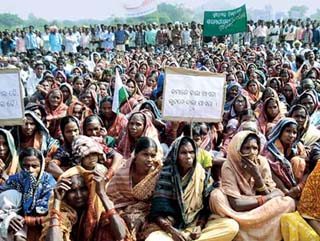Orissa farmers protest against endorsement of genetically modified seeds
 Bhubaneswar, Mar 18: Upset over the government''s apathy towards cotton growers after they had incurred heavy losses due to illegal cultivation of BT cotton, farmers in Orissa, under the banner of the United Coalition Against Genetic Engineering (UNCAGE) held a protest march here on Tuesday.
Bhubaneswar, Mar 18: Upset over the government''s apathy towards cotton growers after they had incurred heavy losses due to illegal cultivation of BT cotton, farmers in Orissa, under the banner of the United Coalition Against Genetic Engineering (UNCAGE) held a protest march here on Tuesday.
UNCAGE, the forum comprising of farmers and voluntary fora in Orissa were protesting against the impending regularisation of illegal cultivation of BT cotton and the government''s proposal to conduct field trails of BT brinjal, also a genetically modified crop.
Alleging that big multinationals are illegally selling BT cotton seeds to farmers, the consortium of UNCAGE and other NGOs protested against these intentions of the state government.
They further alleged that the farmers who sowed the BT cotton seeds were promised of a bumper yield to the tune of nine to ten quintals of cotton per acre whereas in reality it was hardly two to three quintals per acre.
"It is not allowed to grow BT cotton in Orissa but still BT cotton seeds were found here and farmers have been growing BT cotton illegally for the last one year. The Government turned a blind eye at this illegal cultivation as a result the farmers have incurred great losses," said Jaganath Chatterjee, President, UNCAGE.
The farmers claimed that they were provided with inferior cotton seeds, as such they are now demanding compensation from the government for the losses incurred by them.
"We have suffered a lot of loss due to BT cotton cultivation. We were provided bad cotton seeds and have come here to demand for compensation," said Ala, a cotton grower.
Despite all the adverse trends, the farmers alleged that the Agriculture Department of Orissa is bent upon regularising the illegal BT cotton cultivation in the State and also encourage field trials of BT brinjals.
India allowed commercial cultivation of bacillus thuringiensis or Bt cotton in 2002, sparking off protests from activists who say genetically altered crops are a health hazard, spoil soil texture and harm the environment.
Increasing cotton output has encouraged government officials to support the technology, which is seen as a viable step to feed the country''s more than one billion population when farmland is shrinking rapidly due to industrialization and urban spread. (ANI)